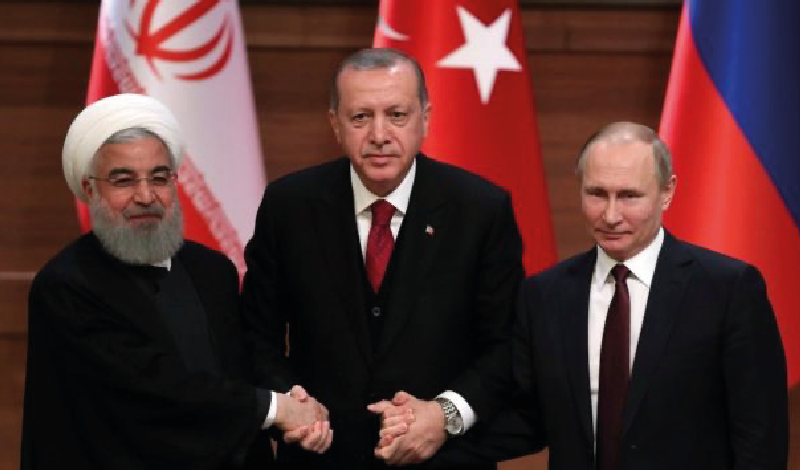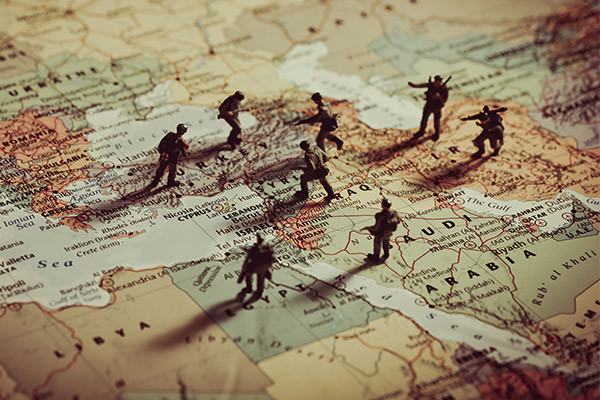Tehran Summit: Actions will matter more than words
The Tehran summit focused on the Syrian crisis and combating terrorism, but in fact it contains details of pledges that will lead to the transfer of the alliance between Iran and Russia to an unprecedented strategic level.

- by Rasha Al Joundy ,
- Thursday, 21st July, 2022
The Tehran summit between Russia, Turkey and Iran ended with a final statement focused on fighting terrorist organizations in Syria and ending the Syrian crisis through the political track in the Astana negotiations denying any military solution for the crisis. These expressions gave a superficial agreement on contested issues to portray the meeting as a success. In practice, however, each of these countries has different interpretations on terrorism in Syria which hides agendas that can only be achieved by causing a crisis and personal losses. In reality, the endgame of the three countries in dealing with terrorist organizations presents a conflict in the mechanism of combating these organizations.
For Turkey, President Recep Tayyip Erdogan believes that the time is ripe to achieve the Turkish strategic goals by starting a military operation against the “Syrian Democratic Forces,” which includes the People’s Protection Units, a branch of the Kurdistan Workers’ Party, pushing them further from the border with Turkey. President Erdogan’s understanding is based on changes to conditions on world stage, and the need for Turkey’s diplomatic efforts dealing with President Putin to mediate on issues related to the Ukrainian war, including the grain crisis. Furthermore, there is no appetite among western allies to agitate President Erdogan at this point to prevent a Turkish Veto against Finland and Sweden joining NATO. These critical issues will limit American response against any Turkish military operation in Syria. At the same time, both Russia and Iran have an interest in keeping Turkey in the middle thus not to completely reject its security demands in Syria. The two countries believe that Turkey is causing tension in Washington and NATO, and both are working tirelessly to pressure Iran to sign the JCPOA as well as pressure Russia to declare defeat in Ukraine. President Erdogan role as a mediator is what allows him to participate in a summit with countries considered pariahs by the international community.
For Russia, the issue of dealing with organizations considered by Turkey as terrorists is related to Russian endeavor to restore Syrian regime’ forces to areas controlled by the opposition factions. This may explain the presence of Syrian FM, Faisal Al Miqdad, at the summit. Previously, Russia sought this goal through a deal with the Syrian Democratic Forces, but the American pressure on the Kurds may have prevented its achievement. Thus, Erdogan’s operation may lead to the same goal with the side effect of achieving Turkish military gains. In this scenario, Russia would benefit from increasing the United States’ nervousness from the Turkish role in Syria, since Turkey would undermine the position of US allies. However, this could also provide President Biden with an excuse to withdraw US troops from Syria, since US military withdrawal from the region has been the most constant policy by the Biden administration. In addition, Russia does not want Iran and its militias to achieve military gains that may harm Russia’s interests or influence in Syria, especially that Russia was forced to withdraw some of its forces to bolster its military operations in Ukraine. Thus, President Putin finds Turkey's role useful in achieving a tactical objective – that could be prolonged with the continuation of the war in Ukraine - and Russia’s rising need for partners in Syria (Iran-Turkey) that are balanced in power and whose interests can be manipulated to serve Russian interest while reducing its boots on the ground.
As for Iran, the Supreme Leader Ali Khamenei's warning of the repercussion of any Turkish intervention in Northern Syria indicates Iran’s' understanding of the impact such Turkish military operation may have on the political and military situation in Syria. Nevertheless, Iran needs to use the current political conditions to achieve strategic goals with Russia that were previously not possible. Firstly, Iran may demand a full execution of its previous “S-300” deal which could open the discussion on “S-400”, and possibly the purchase of Sukhoi, and MiG jet fighters to bolster Iran’s air defense and reinforces its tattered air force capabilities. This could be in exchange for the Iranian drone deal with Russia, which has been widely circulated. The implementation of such deals would mean a transition in the Iranian-Russian relations to a strategic level that include military cooperation, at a time when both countries are facing international pressures due to their military and political agendas. Secondly, the National Iranian Oil Company concluded a memorandum of understanding with Russia's Gazprom company worth 40 billion dollars to develop The Kish and North Pars gas fields and other projects related to the construction of gas export pipelines, which will help Iran develop its aging oil sector away from sanctioned Western technology. Thirdly, Turkey’s new tendency to invest in Iran by signing agreements to raise trade to $30 billion through cooperation in the fields of energy and defense industries which raises a question about Turkey's commitment to US sanctions against Iran, and the reaction of Washington if Ankara actually took such a step. Fourthly, the announcement by the Governor of Iran Central Bank regarding financial transactions with Russia in Russian ruble and Iranian riyal indicates Iran’s avoidance of US dollar control over global economy, which practically evades the US sanctions on Iran and benefits the competition against the United States. Though disengagement from petrodollar is difficult, but both Iran and Russia see that SWIFT sanctions against Russia has stimulated a tendency to diversify away from the dollar and possibly overcome sanctions related to it.
Despite the Tehran summit’s focus on the three countries' handling of the Syrian crisis through settlements that preserve their own interests, media-outlet approach focused on two symbolic messages of the meeting: Frist, it took place after the Jeddah summit, attended by the US President so it was described as a counter summit. Second message is that US attempt to isolate countries like Iran and Russia, or make them pariah like Saudi, will not succeed. Nonetheless, the strategic outcomes of this meeting, if achieved, will mean a dramatic shift in the nature of Iranian-Russian alliances, and the end of the JCPOA, since it undermines the sanctions and can potentially undermine the option of attack. This is possibly the underlying message in Robert Malley's recent statements, asking Iran to sign the JCPOA or to stay isolated with Russia. The fact that the US policy in the Middle East is adamant to stay away from any military involvement, will leave no pressure on Iran.
Many obstacles stand in the way of achieving the outcomes of Tehran summit, for instance the implementation of high-profile Iranian-Russian arms deals will anger Israel, which will probably react against Iran not against Russia, this makes the bargain dangerous for Iran more than Russia. In addition, the recent incident, which almost erupted into a crisis between Turkey and Iran due to an attempt to target Israelis in Istanbul, has been overlooked, but this does not mean it didn’t affect, or rather reminds the two countries of the limitation of their relations.
President Erdogan knows that he can maneuver his vision between the powers at the moment, taking into account Turkey’s need for Russian gas imports by almost 45% and Iran’s by about 20%. Turkey’s economy could benefit from opening a discussion for a payment mechanism in Turkish lira and the Russian ruble, but Turkey remains a member of NATO, and it still has an interest in the survival of the current world order. That said, Turkey’s commitments to the current world-order contradicts with Russia, Iran, China and other countries’ opinion on the existing US policy, since they think the US itself is undermining the order it created, thus they are seeking to undermine the US and its western allies’ policies on a global possibly unprecedented scale. This means that the Turkish participation in Tehran summit is marginal and nonstrategic, while the Iranian-Russian agreements are the most critical and should be watched closely as it could evolve to a grave, more surprising outcome.

Rasha Al Joundy
Research Supervisor
Read More
Areas of Expertise
- Expert in the Gulf region politics,
- Security and internal affairs and has been working on the GCC region since 2011.
Education
- Master’s degree in International Relations and World Order at Leicester University (UK 2016).
- Graduated from the Faculty of Law – University of Damascus in Syria in 2006
Bio
completed her master’s degree in International Relations and World Order at Leicester University (UK 2016). She graduated from the Faculty of Law – University of Damascus in Syria in 2006, and trained as a lawyer to register at Damascus bar association. She is an expert in the Gulf region politics, security and internal affairs and has been working on this region since 2011. Rasha Currently work as a senior researcher for Gulf affairs and supervise the training program at Dubai Pubic Policy Research Centre.

